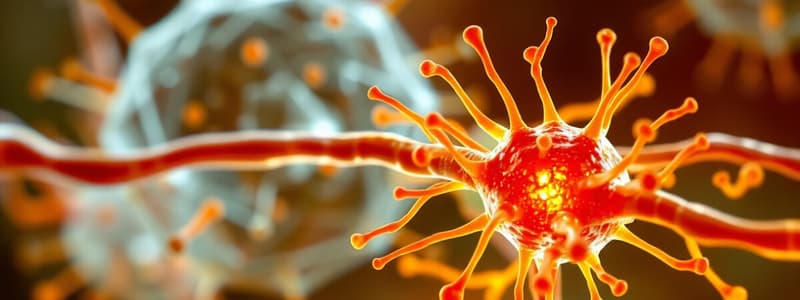Podcast
Questions and Answers
What are the general steps involved in signal transduction?
What are the general steps involved in signal transduction?
- Ligand release, membrane relaxation, and cellular division
- Receptor activation, ligand breakdown, and protein synthesis
- Binding, decomposition, and cellular expiration
- Binding, activation, and production of response (correct)
Which type of receptor opens or closes an ion channel in response to ligand binding?
Which type of receptor opens or closes an ion channel in response to ligand binding?
- Ligand-gated ion channels (correct)
- G-protein-linked receptors
- Transcription factors
- Catalytic receptors
How do plasma membrane receptors primarily function in signal transduction?
How do plasma membrane receptors primarily function in signal transduction?
- By binding to lipid-soluble molecules
- By transforming signals into electrical impulses
- By binding ligands and changing receptor shape (correct)
- By acting solely as ion channels
What is the role of G-protein-linked receptors in the signal transduction process?
What is the role of G-protein-linked receptors in the signal transduction process?
Which of the following best describes catalytic (enzyme-linked) receptors?
Which of the following best describes catalytic (enzyme-linked) receptors?
What primarily characterizes the signaling molecules used in long-range signaling?
What primarily characterizes the signaling molecules used in long-range signaling?
What is an essential feature of plasma membrane receptors?
What is an essential feature of plasma membrane receptors?
Which cellular response can result from signal transduction?
Which cellular response can result from signal transduction?
Flashcards
Signal Transduction
Signal Transduction
The process of transmitting an external signal to the inside of a cell
Cell Signaling
Cell Signaling
Cells communicating with each other, short-range or long-range
Ligand
Ligand
Signaling molecule that binds to a receptor
Plasma Membrane Receptor
Plasma Membrane Receptor
Signup and view all the flashcards
Ligand-Gated Ion Channel
Ligand-Gated Ion Channel
Signup and view all the flashcards
Catalytic Receptor
Catalytic Receptor
Signup and view all the flashcards
G-protein-linked receptor
G-protein-linked receptor
Signup and view all the flashcards
Signal transduction pathway
Signal transduction pathway
Signup and view all the flashcards
Study Notes
Signal Transduction
- Cells in multicellular organisms communicate to coordinate activities
- Communication can be short-range or long-range
- Communication occurs via cell junctions or signaling molecules (ligands) binding to receptors
- Signal transduction is the process of transmitting signals inside a cell
- Signal transduction involves three steps:
- Signaling molecule binds to a receptor
- Signal transduction pathway is activated
- Cellular response is produced
- Plasma membrane receptors are crucial for signaling molecules that cannot enter the cell
- Plasma membrane receptors are integral membrane proteins that transmit signals
- Membrane receptors bind specific molecules in highly specific ways
- Three classes of membrane receptors:
- Ligand-gated ion channels: open or close ion channels in response to a ligand (e.g., acetylcholine opens sodium channels causing muscle contraction)
- Catalytic (enzyme-linked) receptors: have an enzymatic active site, initiated by ligand binding (extracellular side).
- G-protein-linked receptors: do not act as enzymes; bind a G-protein on the intracellular side when a ligand binds, activating secondary messengers (e.g., cAMP)
Signal Transduction Cascades
- Signal transduction cascades help amplify signals
Feedback
- Homeostasis: the set of conditions for successful survival
- Blood glucose levels are regulated by insulin and glucagon
- Negative feedback pathways: the end product inhibits the pathway
- Positive feedback pathways: the end product stimulates the pathway
Studying That Suits You
Use AI to generate personalized quizzes and flashcards to suit your learning preferences.




